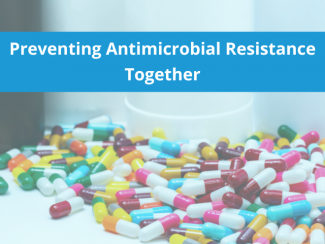
World Antimicrobial Awareness Week (WAAW) is observed from 18-24 November every year. It serves as a reminder of the growing problem of Antimicrobial Resistance and how each one of us can play a role. PatientsEngage breaks down the problem and what we must do to address the problem of AMR together.
What are bacteria?
Bacteria are germs found inside and outside of our bodies. Most germs are harmless, and some can even be helpful to humans, but some bacteria can cause infections, like strep throat and urinary tract infections.
What is an antibiotic?
Antibiotics are critical tools for preventing and treating infections caused by specific bacteria in people, animals, and crops. In health care, antibiotics are one of our most powerful drugs for fighting life-threatening bacterial infections.
What is an antimicrobial?
Antimicrobials – including antibiotics, antivirals, antifungals and antiparasitics – are medicines used to prevent and treat infections in humans, animals and plants.
Antimicrobial resistance (AMR) is a global health and development threat. Researchers estimate that there were an estimated 4·95 million deaths associated with bacterial AMR in 2019, including 1·27 million deaths attributable to bacterial AMR.
What is Antimicrobial Resistance?
Antimicrobial Resistance (AMR) occurs when bacteria, viruses, fungi and parasites change over time and no longer respond to medicines making infections harder to treat and increasing the risk of disease spread, severe illness, increase in hospitalisations and death.
As a result of drug resistance, antibiotics and other antimicrobial medicines become ineffective and infections become increasingly difficult or impossible to treat.
It does not mean our body is resistant to antibiotics or antifungals.
What are the main causes of AMR?
The 6 main causes of AMR have been linked to
- Misuse and over prescription and use of Antimicrobials or antibiotics
- Patients not finishing the entire antibiotic course
- Lack of clean water and sanitation
- Inadequate infection prevention and control
- Overuse of antibiotics in livestock and fish farming
- Absence of new discovery of antibiotics
What can each one of us do to reduce AMR
1. Prevent Antibiotic misuse
- Do not self prescribe antibiotics.
- Do not demand antibiotics from a doctor or a pharmacist.
2. Improve Antibiotic use. Adhere to the regimen
- If your doctor decides an antibiotic is the best treatment when you are sick:
- Take the medication exactly as your doctor tells you.
- Do not share your medication with others.
- Do not save them for later. Talk to your pharmacist/doctor about safely discarding leftover medicines.
- Do not take antibiotics prescribed for someone else. This may delay the best treatment for you, make you even sicker, or cause side effects.
- Talk with your doctor and pharmacist if you have any questions about your antibiotics prescribed to you.
3. Reduce need for antimicrobials
- Stay healthy and keep your family healthy
- Wash hands frequently and shower daily. Use soap when available.
- Break the chain of infection by avoiding contact, going to crowded places, masking and staying at home when sick, covering your mouth while coughing/sneezing, no spitting etc.
- Take the recommended vaccines for children and adults on schedule.
- Practice food hygiene, such as washing fruits/vegetables thoroughly, consuming homecooked and hot meals etc.
1. Antimicrobial Resistance Collaborators. (2022). Global burden of bacterial antimicrobial resistance in 2019: a systematic analysis. The Lancet; 399(10325):P629-655. DOI: https://doi.org/10.1016/S0140-6736(21)02724-0
2. https://www.medtecheurope.org/news-and-events/news/patient-safety-task-force-releases-position-paper-on-amr/
3. https://www.who.int/news-room/fact-sheets/detail/antimicrobial-resistance
4. https://www.who.int/
5. https://infectioncontrol.tips/2015/11/18/6-factors-that-have-caused-antibiotic-resistance/
6. https://www.cdc.gov/antibiotic-use/antibiotic-resistance.html



